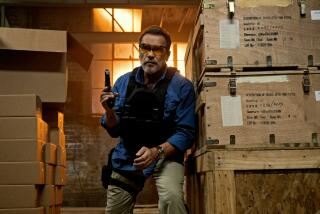The Rambucks Flow In
- Share via
LOS ANGELES — Attention Rambo fans: Coming soon to a store near you--the Rambo bowie knife, 17 deadly inches long with a Damascus steel blade, ebony handle and top-grain leather sheath.
Just $2,250.
You can also get your Rambo action dolls, Rambo survival watches, Rambo camouflage makeup, a full line of posters, calendars, comic books and headbands and, for the first time this year, “Rambuddha” necklaces--plastic replicas of the rugged hero’s jade Buddha charm.
Behind the hype is Carolco Pictures Inc., the producer of the Rambo movies. Carolco not only brought he-man actor Sylvester Stallone to the role and Rambo to the screen, it also controls movie and video rights to the series and sells the right to make Rambo paraphernalia to producers of toys, weapons and the like.
Rambo has been good to Carolco.
In worldwide ticket sales alone, the first Rambo movie earned $120 million and the second is closing on $300 million, according to Kathryn Linclau, Carolco’s vice president for marketing.
Analysts say “Rambo III” will make at least $160 million at the box office in the United States alone, and that is before the profits start rolling in from videocassette and television rights, not to mention the fees from about 70 licenses for Rambo products.
For fans who can’t afford the top-of-the line replica of the knife Rambo uses to dispatch his foes, there will be a stainless steel version for $1,000 and a “utilitarian” version for $125.
New this year will be Rambo Trading Units, gold and silver “survival currency” in $5, $10 and $20 denominations--selling for $59 to $598, according to Danny Simon, who is in charge of licensing for Carolco.
And yes, Linclau added, “‘Rambo IV’ will be a reality.”
On all its operations last year, Carolco made a profit of $11.4 million on sales of $36.4 million. Most of that rode in on Rambo’s broad shoulders.
Stallone has his own production company for the “Rocky” movies and other ventures, but he is on the Carolco payroll for “Rambo”--in a big way: Stallone reportedly gets $16 million plus a piece of the almost-certain profit from “Rambo III.”
But that is money well spent, according to Jeffrey Logsdon, an analyst who follows show business for the Los Angeles investment company Crowell, Weedon & Co.
“He is really playing the role of writer, director, star and creative consultant,” Logsdon said. “When you have that kind of bankable talent, you’re going to have to pay a premium.”
Production costs traditionally are made public only through informed speculation, and the trade paper Daily Variety pegs costs for “Rambo III” at $63 million. Carolco president Peter Hoffman called the estimate high but refused to give another figure.
Logsdon suggests that “Rambo III” likely cost $57 million or $58 million to make, which would put “Rambo III” among the most expensive movies of all time.
“War and Peace,” made in 1966, cost $100 million in 1966 dollars. More recent, non-adjusted figures include those for “Annie” (1982), $51.5 million; “Cotton Club” (1984), $51 million; and “Ishtar” (1987), $45 million.
Carolco, which first sold stock to the public in November, 1986, is truly the house that Rambo built. But management is trying, with mixed success, to add a few new rooms.
The company produced such box-office yawns as “Extreme Prejudice,” with Nick Nolte and Powers Booth, and “Angel Heart,” noted chiefly for a controversial nude scene between Mickey Rourke and TV’s “Cosby” kid Lisa Bonet.
“They weren’t great successes in America,” Linclau acknowledged, “but on the international level they were profitable.”
In the last year, Carolco has bought Orbis Communications, a TV distribution and advertising sales company; IndieProd Co., maker of the movies “Footloose” and “Roxanne,” and International Video Entertainment, a distributor of videocassettes.
Carolco is bringing out another action film this summer, “Red Heat,” starring Arnold Schwarzenegger and Jim Belushi.
“They’re doing all the right things, becoming less dependent on one Rambo film every three years,” Logsdon said. “But there’s no one in Hollywood who doesn’t envy them over that franchise.”
More to Read
Inside the business of entertainment
The Wide Shot brings you news, analysis and insights on everything from streaming wars to production — and what it all means for the future.
You may occasionally receive promotional content from the Los Angeles Times.










